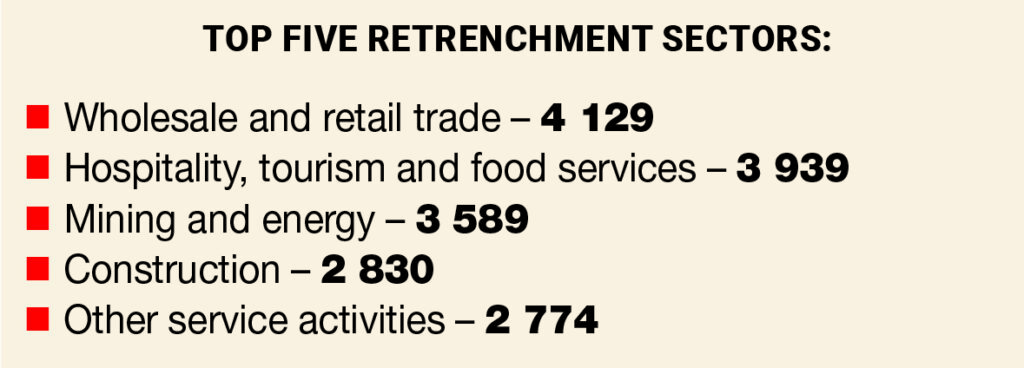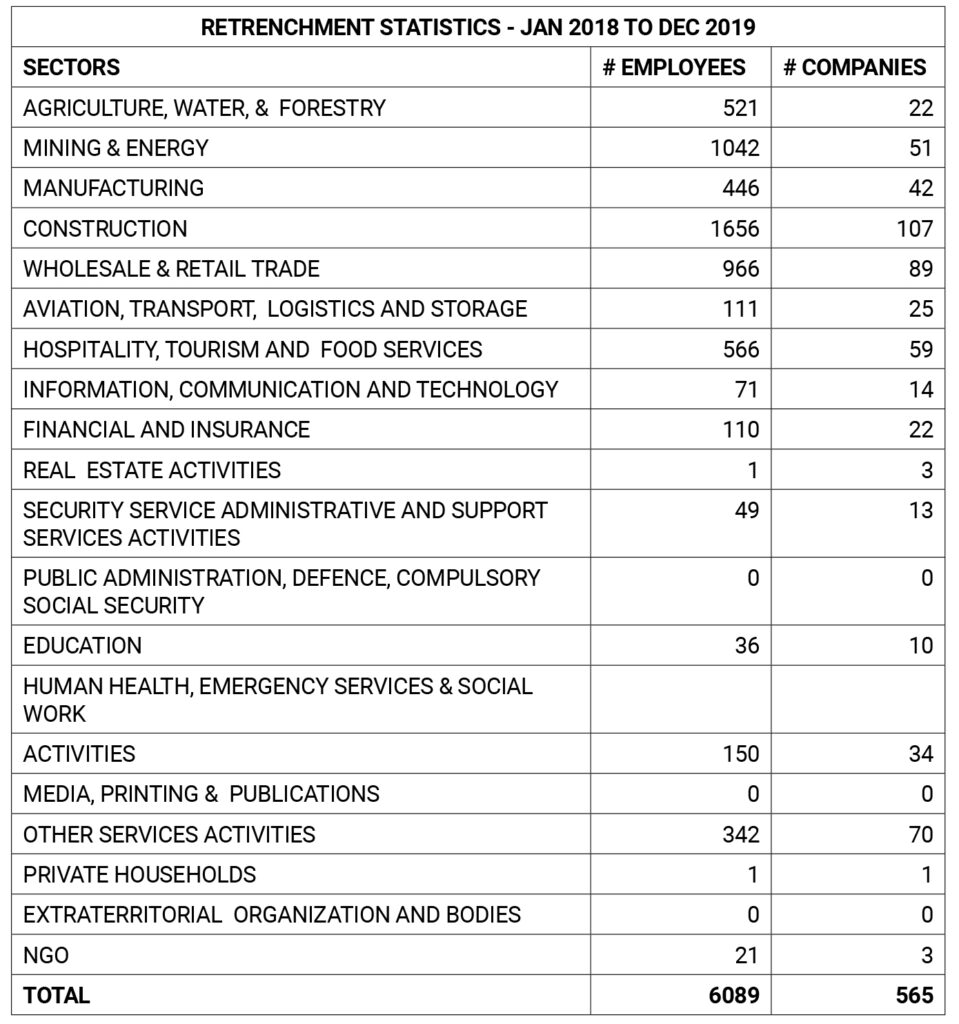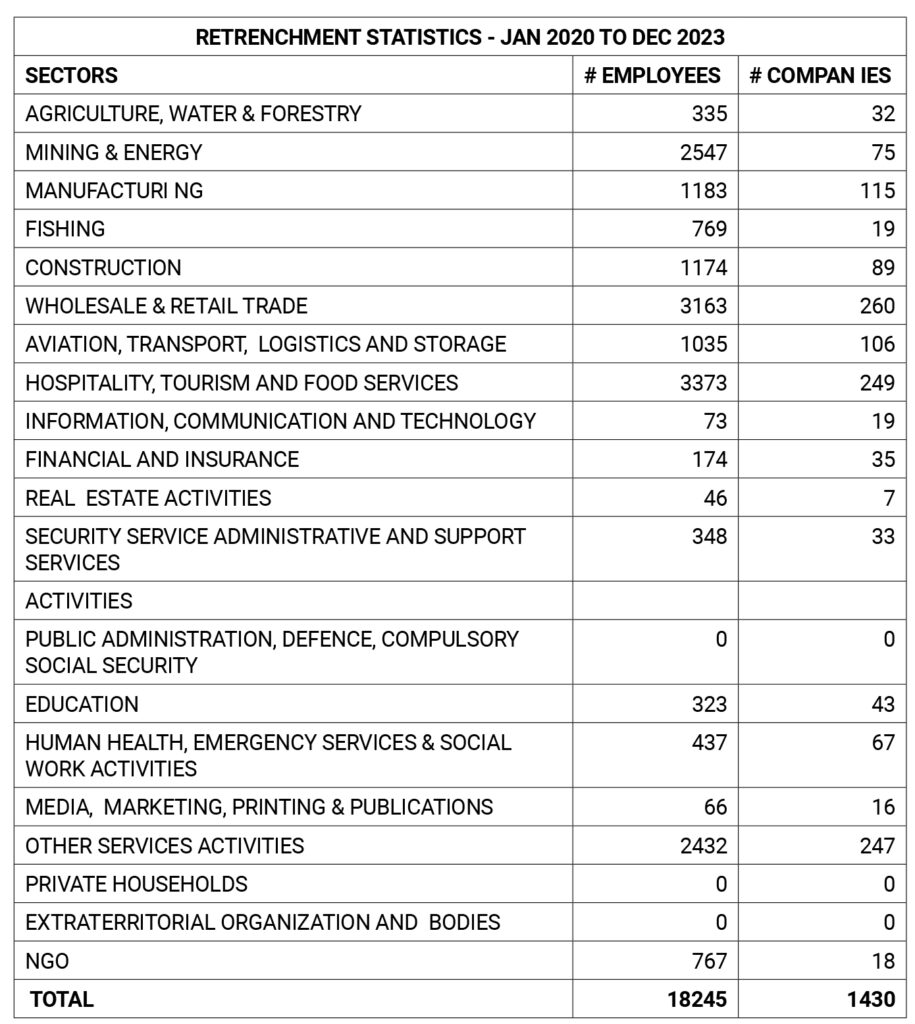Over 24 000 private sector employees in Namibia have lost their jobs in the past five years.

This took place amid the economic downturn, ongoing drought and the Covid-19 pandemic.
This is reflected in the latest figures on employment in Namibia, released by the Ministry of Labour, Industrial Relations and Employment Creation this week.
Labour, industrial relations and employment creation executive director Lydia Indombo says 24 334 employees were retrenched between January 2018 and December 2023.
The pandemic and its aftermath alone claimed the jobs of 18 245 employees at 1 430 companies.
Before Covid-19, the ministry recorded a total of 6 089 job losses at 565 companies.
These figures are for the period from January 2018 to December 2019.
NO STATE RETRENCHMENTS
No retrenchments have taken place in the public sector in the past five years. Prior to the pandemic, the highest number of employees retrenched was 1 656 from a single sector.
After the pandemic, this has more than doubled, with the highest number of employees recorded to have lost their jobs in a single sector being 3 373.
Statistics for the last five years indicate that the wholesale and retail trade sector claimed the most employees, totalling 4 129.
The International Monetary Fund (IMF) in October established that Namibia’s unemployment rate stands at 21%, and is particularly acute among the youth.
These were preliminary findings after a visit to the country.
“Namibia’s leading economic sector, mining and energy, recorded the second-highest retrenchment numbers, with 3 589,” the IMF stated.
Another 3 393 employees in the hospitality, tourism and food services sector were sent home.
The construction industry continues to face losses, with 2 830 workers from 107 companies losing their jobs.
The construction industry has been facing significant growth challenges since 2016.
In that year, the industry experienced a 41% year-on-year contraction, and has remained in negative growth territory ever since.
It reported a further annual contraction of 16% in 2022, based on preliminary national accounts from the Namibia Statistics Agency (NSA).
In April, The Namibian reported that the local construction industry is in a shambles, and that contractors would depend more on private projects with the government stalling many projects.
The ministry also indicated that the category for other services and activities recorded the fifth-highest number of retrenchments, with 2 774.

‘NOT SURPRISING’
Labour analyst Sydwill Scholtz says these statistics are nothing short of shocking.
“To see how many households and people were affected by the loss of work and the downward spiral of the economy, coupled with the increased living costs, makes for a ticking time bomb,” he says.
He says unemployment is one of the major causes of poverty and could cause a higher crime rate.
“However, it was not only these 24 334 people who were affected by job losses. The employees who stayed behind also in many instances did not receive salary increases, and many had seen salary cuts, which means the general population of the working class has been worse off than before,” Scholtz says.
He says companies currently find it risky to employ people due to the associated costs.
“This leads to companies having to work with skeleton staff and many employees having to do more than one person’s job just to keep their income and make ends meet,” he says.
Another labour expert, Herbert Jauch, says the statistics show how rampant retrenchment is in the mining industry, which employs fewer than 10 000 people overall, but retrenched 2 547 workers between 2020 and 2023.
“This constitutes more than a quarter of the workers in the industry,” he says.
On the hospitality and tourism sector, Jauch says the cuts could be largely due to the shut-down during the Covid pandemic.
“It would be important to see how many of those retrenchments happened in 2020/21, when the pandemic hit hardest,” he says.
Jauch says the number of retrenchments within the wholesale and retail sector is concerning.
“Another worrying figure is the large number of retrenched workers in the industry and in other services,” he says.
“The service sector has been providing a significant number of jobs in recent years, and thus the high number of retrenchments is a very worrying sign of the overall unemployment crisis,” he says.

ECONOMY
The cost of living in Namibia has become unbearable for most households, with some food prices having more than doubled over the past decade.
With high inflation rates and low wages, the increase in the cost of living has hit low-income households the hardest.
The current repo rate of 7,75% is the highest it has been in the past 14 years.
The Bank of Namibia’s monetary policy committee has kept rates unchanged since August.
The central bank in its most recent domestic economic outlook said there has been improvement across most sectors, particularly mining, electricity generation, livestock agriculture, wholesale and retail trade, tourism, communication and transport.
“Activity in the construction sector, however, remained weak. For 2023, gross domestic product growth is estimated to decline to 3,9% from 7,6% in 2022, largely on account of slower growth in the primary industry, following the high base set in this industry during 2022.
“Likewise, growth is expected to slow further to 3,4% in 2024,” the central bank said.
BUSINESS RESCUE
In 2021, president Hage Geingob appointed a business rescue task force to assist the government with helping the private sector in the face of the country’s ailing economy and companies struggling to survive amid the pandemic.
The task force has identified the forces making the business environment difficult as the economic recession, drought and the Covid-19 pandemic.
“Catastrophic impact: high business distress, numerous business closures, cut salaries and/or retrenchments [and] high job losses,” the report reads.
The 12-member committee provided eight immediate solutions to the issue. It wanted the government to suspend or waive penalties and interest where the issue was caused by the economy. Another proposal was to relax the criteria used to issue good standing certificates.
“Extension of tax amnesty deadline, review of legislation regarding penalties and interest, enhanced service delivery through review of processes and digitisation, encourage local procurement, and value-added tax refunds to be processed faster,” the task force’s report reads.
MORE RETRENCHMENTS
Rent-A-Drum retrenched 21 employees from its Swakopmund operations after the company’s contract with the Swakopmund municipality for household recycling collections expired on 30 May. Hangana Seafood cut its workforce by 199 employees in October.
Pick n Pay retrenched more than 500 Namibians in 2020.
In the same year, the Tschudi Mine near Tsumeb let go of over 400 workers.
About 22 workers were retrenched from Sperrgebiet Diamond Mining, which has been operating for about eight months, in July.
Stay informed with The Namibian – your source for credible journalism. Get in-depth reporting and opinions for
only N$85 a month. Invest in journalism, invest in democracy –
Subscribe Now!







